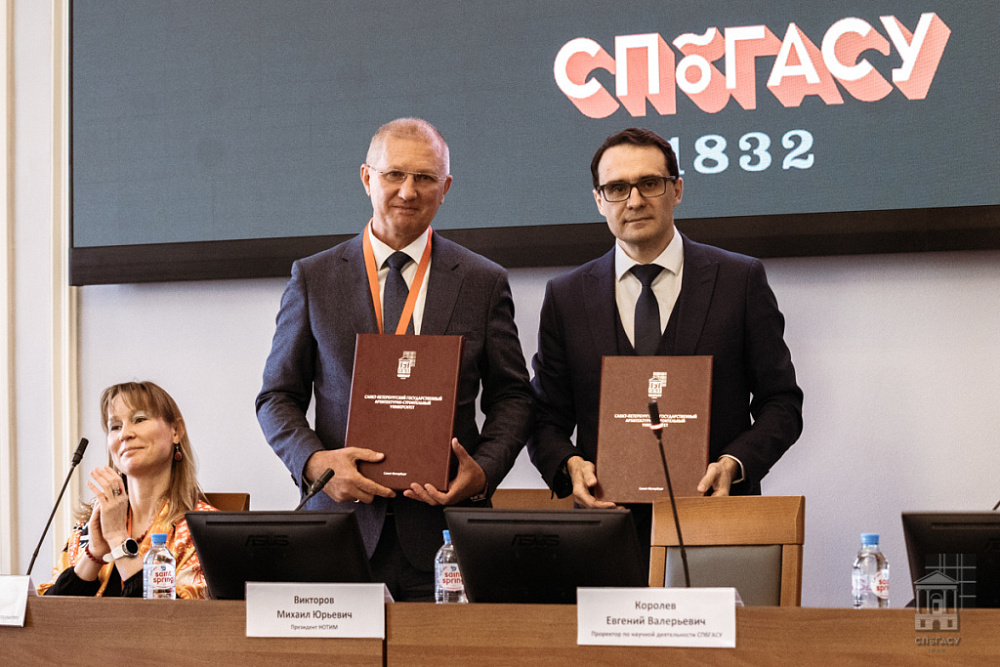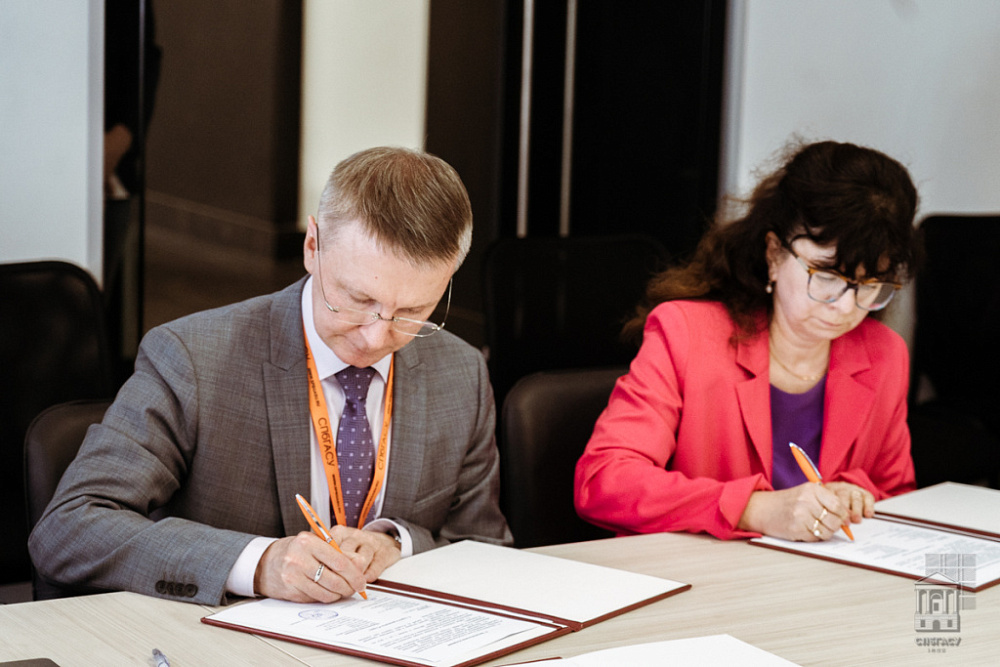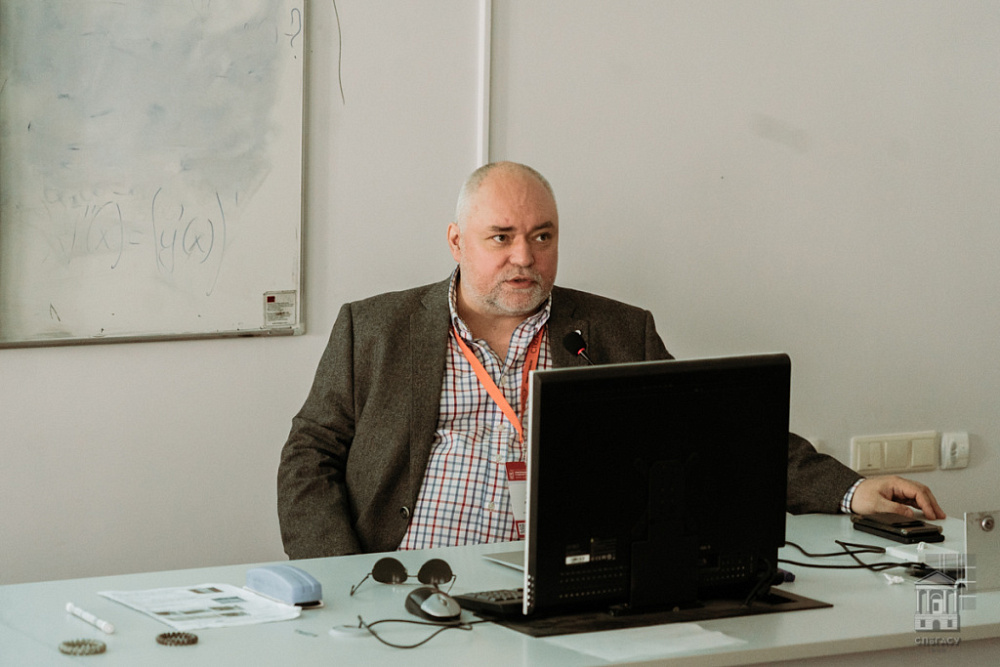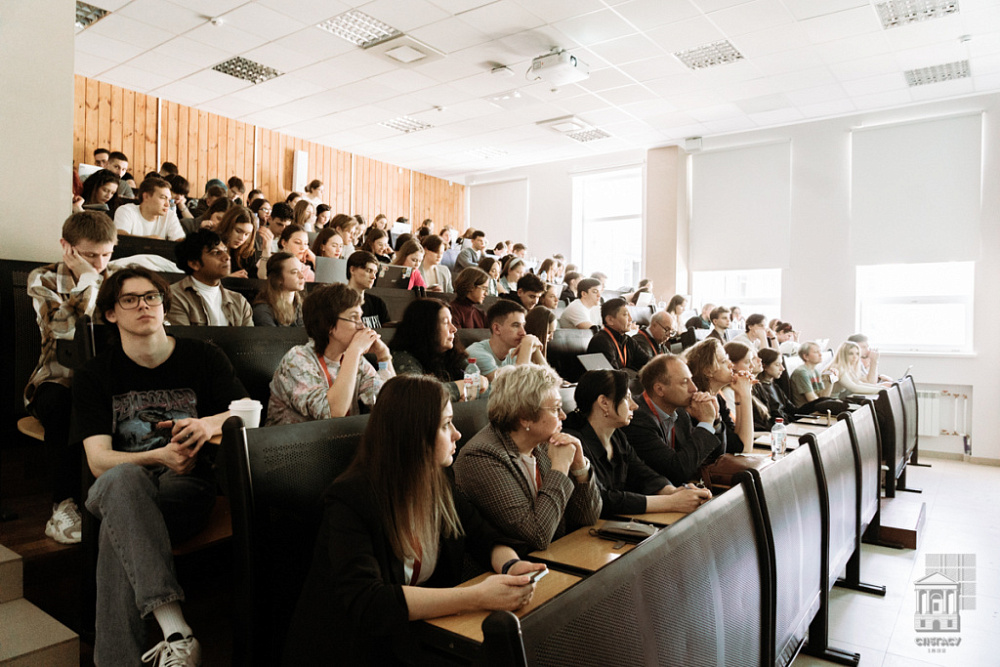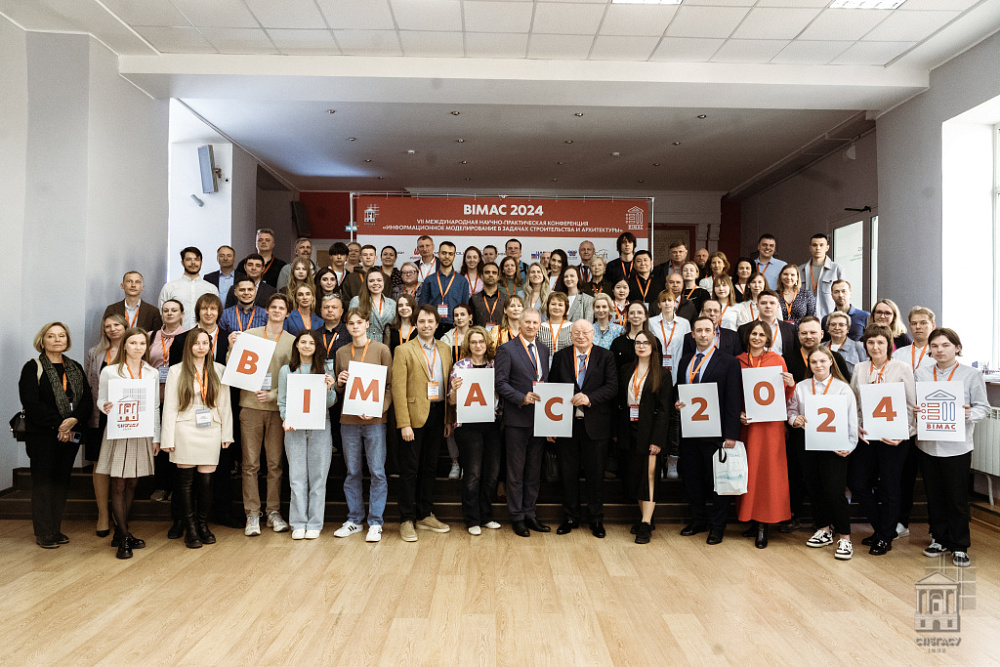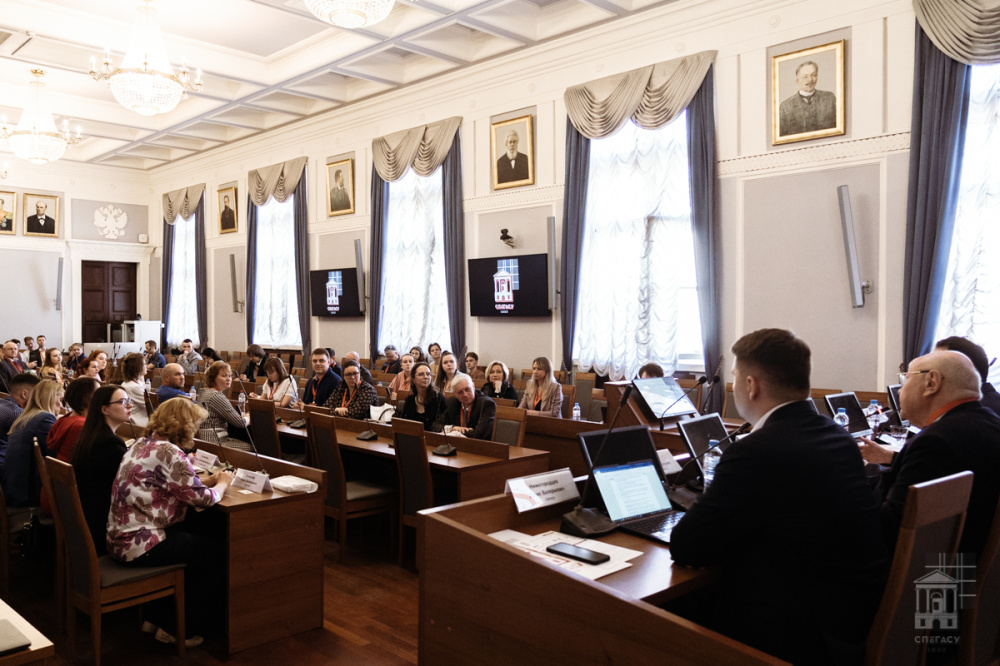 Plenary session
Plenary session
On 15–17 May, SPbGASU hosted the VII International Scientific and Practical Conference “Information Modeling in the Problems of Construction and Architecture” (BIMAC-2024). It brought together 490 participants from 11 countries. The organizer was the SPbGASU Department of Information Systems and Technologies, the Division for Digital Competence in Construction and the Institute for Continuing Education.
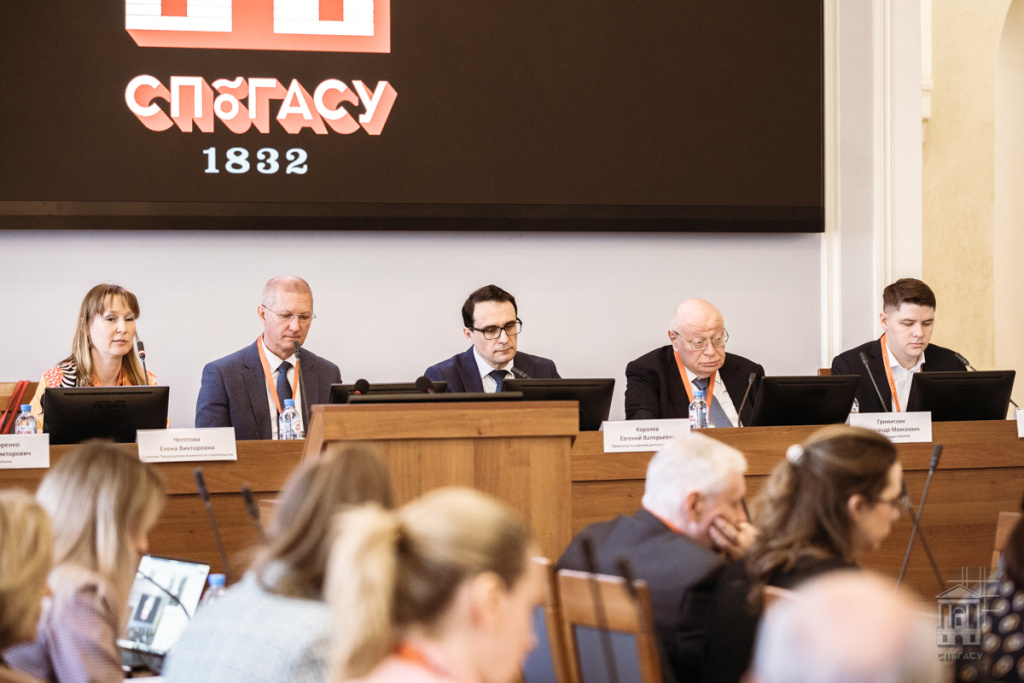 Plenary session. On the presidium: Elena Chegotova, Mikhail Viktorov, Evgeny Korolev, Aleksandr Grimitlin, Denis Nizhegorodtsev
Plenary session. On the presidium: Elena Chegotova, Mikhail Viktorov, Evgeny Korolev, Aleksandr Grimitlin, Denis NizhegorodtsevAt the plenary session, the SPbGASUVice-Rector for Research Evgeny Korolev emphasized that digital transformation would affect all spheres of society. Architecture and construction are at the forefront of this transformation. Maintaining the pace of development of the construction industry largely depends on the coordinated work of the participants in the process - government authorities, the professional community, specialized software developers, teachers, and researchers. SPbGASU is actively involved in this process and is interested in training specialists who have a high level of competencies in information modeling technologies, as well as specialized domestic software. Training such engineering personnel is a complex, systemic task. To solve this problem, SPbGASU, as a federal innovation platform, is creating a methodology for developing digital competencies. The university holds student TIM championships, organizes school TIM classes and training courses together with leading Russian companies. The conference is an important link in the discussion of various aspects of the use of information modeling technologies, the formation of digital competencies among students and industry specialists.
Despite the opinion of skeptics, digitalization will happen, believes Elena Chegotova, adviser to the chairman of the Construction Committee of the Government of St Petersburg. Legislative stimulation of this process is carried out in two directions: the mandatory introduction of information modeling technologies and the development of electronic document management. According to Elena Viktorovna, the business community should help legislators improve legal regulation in these areas, as well as develop requirements for software manufacturers under the new regulations.
The need to reduce the digital gap between large cities and the rest of Russia was emphasized by the Vice-President of the National Association of Designers and Surveyors (NOPRIZ), Chairman of the NOPRIZ Committee on Digitalization of Architectural and Construction Design, Aleksandr Grimitlin. Aleksandr Mikhailovich also highly assessed the level of teaching and student interest in new technologies at SPbGASU.
The President of the “National Association of Organizations in the Field of Information Modeling Technologies” (NOTIM), head of the commission for digitalization of the construction industry and housing and communal services of the Public Council under the Russian Ministry of Construction, Mikhail Viktorov, is confident that all reforms are personalized. According to him, the leaders of digital reform - Deputy Chairman of the Government of the Russian Federation Marat Khusnullin, Minister of Construction and Housing and Communal Services of Russia Irek Fayzullin - have extensive experience. It is important that the correctness of their course was confirmed by the President of the Russian Federation Vladimir Putin and the Chairman of the Government of the Russian Federation Mikhail Mishustin.
Mikhail Viktorov made a presentation “The current situation of digital transformation in construction. Results and immediate development priorities.” The speaker told about the advantages of Russian software over foreign ones, identified based on the results of the NOTIM survey. Among them are cost without reference to exchange rates, information and national security, taking into account the requirements of the Russian legal, scientific and technical framework, ease of development and use. There are also problems, including rising prices for Russian software, lack of funding and subsidies for its implementation. Mikhail Yuryevich identified the immediate priorities for the implementation of information technologies, listed the necessary support measures and informed that following the results of the Strategic session on the creation of a comprehensive import-independent national TIM solution dated 15 April, 2024, an initiative was put forward to organize a professional platform for discussion, testing and formation of an independent TIM-platforms for industrial facilities. The corresponding working group will operate on the basis of NOTIM with the participation of the State Corporation Rosatom.
Anastasia Golovaneva, BIM expert at Vysotskiy Consulting company, spoke about the development of BIM (TIM) in Russia. The first domestic developments of such software, created on the basis of Revit or other foreign software, appeared in 2012. At that time, high demands were not placed on the models, and there were no uniform standards. With government support, this area has received significant development, but the need to develop uniform standards remains. The problem of staff shortages has not been resolved either.
Director for work with key customers at CSoft Development (CSoft group of companies) Vadim Antonov presented the NS Project software product - a comprehensive “3 in 1” solution for project management. The electronic archive and document management tool organizes work with files in a protected environment with a clear distribution of access rights; project and process management visualizes and optimizes the progress of the project with the distribution of time, labor and financial resources; construction management plans and monitors the progress of construction and installation work, ensures accounting of costs and resources.
Development Director of K4 LLC Elena Kolosova made a report “Information Modeling Today and Tomorrow”. According to the speaker, information modeling technologies can provide a new quality of design, as well as coordinated and fully equipped construction.
Deputy Director of Renga Software Maksim Nechiporenko highlighted the personnel situation in the field of information modeling technologies. He noted that to overcome the personnel shortage, a systematic approach to training the younger generation is needed - with the participation of the state, educational institutions, and enterprises that are interested in new employees. As a successful example, he cited TIM classes created at schools as part of a joint project between Renga Software and SPbGASU.
Denis Nizhegorodtsev, director of the SPbGASU LDBIM Training Center, reported on the innovative methodology for training TIM specialists at the university. The Division for Digital Competence in Construction, the LDBIM Training Center, the Division for Curriculum Development and Academic Work and the Institute for Continuing Education are involved in the issues of their preparation. In the status of a federal innovation platform in 2022–2026, the university is implementing two innovative educational projects: “Modern educational technologies to ensure occupational safety in the construction industry” and “Innovative methods for developing digital professional competencies of students and specialists in the construction industry”.
The conference program included three sections and a business program. Major events included a working meeting of the Northwestern Federal District Construction Industry Consortium on digitalization of construction project management processes; advanced training course “Information modeling in construction and architecture problems”, during which the head of the information technology department of JSC “AI-New Construction Solutions” Aleksandr Soldatov gave an open lecture on the use of artificial intelligence in construction and performed test drives of the software; defense of projects of the SPbGASU TIM-Championship at various levels; round tables “Prospects for the development of independent qualification assessment in the field of information modeling technologies” and “Pre-professional training in construction and housing and communal services”.
During the conference, SPbGASU concluded a number of new cooperation agreements. Among them are an agreement on interaction with the association “National Association of Organizations in the Field of Information Modeling Technologies”, cooperation agreements with the Novgorod Construction College and four St Petersburg schools.





